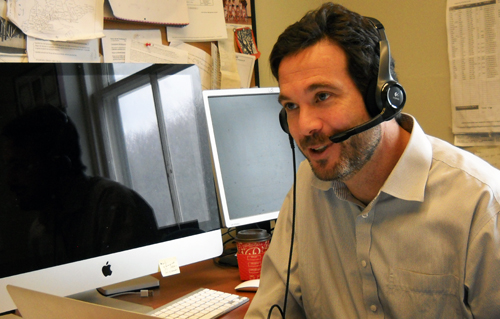
Prof. Brady Deaton, radio guy?
Not exactly. This isn’t CBC Radio, after all. But the professor in the Department of Food, Agricultural and Resource Economics (FARE) is building an international listening audience and exploring a new teaching tool through radio-style podcast interviews with experts in his field.
In a two-year-old podcast series called FARETalk, Deaton interviews economists to learn more about selected topics and to help further his own research and teaching. The recorded interviews are available on the FARE website.
Since 2011, he’s recorded almost a dozen hour-long talks on subjects ranging from farm subsidies to the United States Farm Bill to farm succession planning to First Nations lands to Canadian manufacturing woes.
In a recent episode, he reviewed the book The Food Police: A Well-Fed Manifesto About the Politics of Your Plate by Jayson Lusk, an agricultural economist at Oklahoma State University.
Another podcast discussed the effects of farm subsidies on land prices. That’s based on a 2011 paper by Barry Goodwin, a professor at North Carolina State University.
“I’m working on that area and thought it sounded interesting. I’ll do a podcast. That forces me to think through the issues more thoroughly,” says Deaton. As a bonus, he figures he can use the result in a graduate course next semester.
He’s interviewed academics about the Canadian Wheat Board, former employees of Statistics Canada, individuals from the Ontario Ministry of Agriculture and Food, and the First Nations Lands Advisory Board. Closer to home, Deaton devoted one podcast to property rights, discussed with FARE professor Glenn Fox.
His listeners in Canada and the United States include other economists as well as policy-makers, government workers, researchers and students.
He records most interviews in his MacLachlan Building office.
For one event, he involved undergrad students in his land economics class in a podcast with Tom Flanagan, former political science professor at the University of Calgary. All 50 students met in a Rozanski Hall classroom, where they asked their “guest” economist about First Nations property rights.
Deaton got the podcast idea from listening to a similar series called EconTalk by Russell Roberts, economics professor at George Mason University.
The Guelph professor saw his own series as a way to use his extensive reading in the field. “I read widely and I’m genuinely interested in a variety of issues and wanted to find some kind of output that reflects that. I’m excited, but I want to share. The podcast is an outlet for that excitement.”
At first, he worried about whether he’d attract listeners. He’s now receiving enough emails – many from agricultural economics departments in the U.S. — to know that people are listening and using his podcasts in their own classrooms.
Deaton says a growing audience benefits not just himself but also U of G. “This is good press for the University, for me and everyone it represents.”
He enlisted help from experts at Open Learning and Educational Support on campus, notably director Peter Wolf and Richard Gorrie, manager, Learning Technology and Courseware Innovation.
Gorrie and Jakub Hyzyk, e-learning technology assistant, have produced the podcasts. The series is funded by the Institute for the Advanced Study of Food and Agricultural Policy within FARE.
Deaton says preparing for interviews takes more time than he’d expected. But so far, the results have made his effort worthwhile. “I get to use it in the classroom. It’s important that it enhance research and teaching and not substitute for either.”
He’s also learning some new interview skills.
Normally he’s the expert answering students’ questions. Now he effectively switches sides to quiz someone else.
“You’re asking the expert about their field. There’s always a fear. You want to ask good questions, not irrelevant questions. It’s a helpful reminder as a teacher that every question is valued.”
He’s learning to pose more concise queries and curb an impulse to interject during answers. How does he like his radio voice? “I still cringe, but I think I’m getting somewhat better.”
“It’s like a bird singing on a wire, I do it because I enjoy it. I’ve learned a lot. It’s another form of learning for me.”
The venture even helped attract a grad student to the department. Karthik Nadella was working as a program analyst at the Ontario Ministry of Agriculture and Food in Guelph when he began listening to FARETalk.
Last year, he began a master’s degree, studying environmental impacts of owned and rented farmland. About 40 per cent of Canadian farmland is tenant-occupied.
Referring tongue-in-cheek to his supervisor, Nadella says, “He convinced me I should leave my job and start graduate work.”